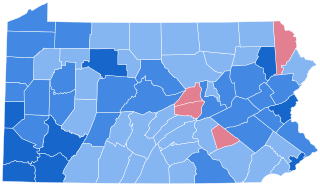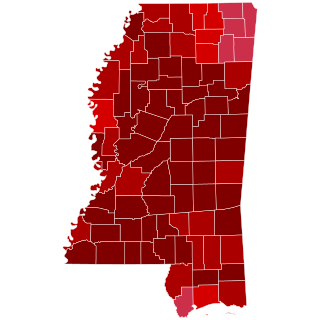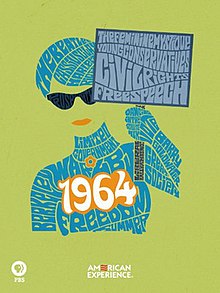
Barry Morris Goldwater was an American politician and major general in the Air Force Reserve who served as a United States senator from 1953 to 1965 and 1969 to 1987, and was the Republican Party's nominee for president in 1964.

Presidential elections were held in the United States on November 3, 1964, less than a year following the assassination of John F. Kennedy, who won the previous presidential election. Incumbent Democratic President Lyndon B. Johnson defeated Republican Senator Barry Goldwater in a landslide victory. Johnson was the fourth and most recent vice president to succeed the presidency following the death of his predecessor and win a full term in his own right. Johnson won the largest share of the popular vote for the Democratic Party in history at 61.1%. As of 2024, this remains the highest popular vote percentage of any candidate since the advent of widespread popular elections in 1824.

Phyllis Stewart Schlafly was an American attorney, conservative activist, and anti-feminist, who was nationally prominent in conservatism. She held paleoconservative social and political views, opposed feminism, gay rights, and abortion, and campaigned against ratification of the Equal Rights Amendment to the U.S. Constitution.

The Mississippi Republican Party is the Mississippi state affiliate of the United States Republican Party. The party chairman is Frank Bordeaux, and the party is based in Jackson, Mississippi. The original Republican Party of Mississippi was founded following the American Civil War, and the current incarnation of the Mississippi Republican Party was founded in 1956. The party would grow in popularity after the 1964 Civil Rights Act and is currently the dominant party in the state.
Elly M. Peterson, was an American politician from Charlotte, Eaton County, Michigan.
Movement conservatism is a term used by political analysts to describe conservatives in the United States since the mid-20th century and the New Right. According to George H. Nash in 2009, the movement comprises a coalition of five distinct impulses. From the mid-1930s to the 1960s, libertarians, traditionalists, and anti-communists made up this coalition, with the goal of fighting the liberals' New Deal.

The 1964 United States presidential election in Rhode Island took place on November 3, 1964, as part of the 1964 United States presidential election, which was held throughout all 50 states and D.C. Voters chose four representatives, or electors to the Electoral College, who voted for president and vice president.

From March 10 to June 2, 1964, voters of the Democratic Party chose its nominee for president in the 1964 United States presidential election. Incumbent President Lyndon B. Johnson was selected as the nominee through a series of primary elections and caucuses culminating in the 1964 Democratic National Convention held from August 24 to August 27, 1964, in Atlantic City, New Jersey.

A Choice Not an Echo is a non-fiction book self-published in 1964 by movement conservative activist Phyllis Schlafly. It was the first of Schlafly's 19 books and sold three million copies, bringing her to national attention as a conservative activist. Schlafly published this book to support Arizona Senator Barry Goldwater in his presidential candidacy, hoping to help him triumph in the California primary, cementing his chances for obtaining the Republican party nomination. Schlafly's secondary motivation behind the publishing of A Choice Not an Echo was to break control of the "Eastern Establishment" over the Republican Party. In other words, her book served as an exposure of the covert influence that, in her word, "kingmakers" had on Republican primary nominations.

The 1964 United States presidential election in Pennsylvania took place on November 3, 1964, and was part of the 1964 United States presidential election. Voters chose 29 representatives to the Electoral College, who voted for president and vice president. Pennsylvania overwhelmingly voted for the Democratic nominee, President Lyndon B. Johnson, over the Republican nominee, Senator Barry Goldwater. Johnson won Pennsylvania by a margin of 30.22%. Apart from William Howard Taft in 1912, Goldwater's 34.7% of the vote is easily the worst showing for a Republican in the state since the party was founded. Even relative to Johnson's popular vote landslide, Pennsylvania came out as 7.64% more Democratic than the nation at-large; the only occasion under the current two-party system that the state has been more anomalously Democratic than this was in Ronald Reagan's 1984 landslide.
Women in conservatism in the United States have advocated for social, political, economic, and cultural conservative policies since anti-suffragism. Leading conservative women such as Phyllis Schlafly have expressed that women should embrace their privileged essential nature. This thread of belief can be traced through the anti-suffrage movement, the Red Scare, and the Reagan Era, and is still present in the 21st century, especially in several conservative women's organizations such as Concerned Women for America and the Independent Women's Forum.

The 1964 United States presidential election in New York took place on November 3, 1964, as part of the 1964 United States presidential election in which all 50 states plus the District of Columbia participated. New York voters chose 43 electors to represent them in the Electoral College via a popular vote pitting incumbent Democratic President Lyndon B. Johnson and his running mate, President pro tempore of the Senate Hubert Humphrey, against Republican challenger and Senator Barry Goldwater from Arizona and his running mate and Chair of the Republican National Committee, William E. Miller.

The 1964 United States presidential election in Massachusetts took place on November 3, 1964, as part of the 1964 United States presidential election, which was held throughout all 50 states and D.C. Voters chose 14 representatives, or electors to the Electoral College, who voted for president and vice president.

The 1964 United States presidential election in Vermont took place on November 3, 1964, as part of the 1964 United States presidential election in which all 50 states plus the District of Columbia participated. Vermont voters chose 3 electors to represent them in the Electoral College via a popular vote pitting incumbent Democratic President Lyndon B. Johnson and his running mate, Senate Majority Whip Hubert Humphrey, against Republican challenger and Senator Barry Goldwater from Arizona and his running mate and Chair of the Republican National Committee, William E. Miller. It was the first time in Vermont's history that the state voted for the Democratic candidate, and the first time since the Republican Party's foundation that the state voted against its candidate.

The 1964 United States presidential election in New Hampshire took place on November 5, 1964, as part of the 1964 United States presidential election, which was held throughout all 50 states and D.C. Voters chose four representatives, or electors to the Electoral College, who voted for president and vice president.

The 1964 United States presidential election in Mississippi was held on November 3, 1964, as part of the 1964 United States presidential election, which was held on that day throughout all fifty states and the District of Columbia. Voters chose seven electors, or representatives to the Electoral College, who voted for president and vice president.

The 1964 United States presidential election in Maine took place on November 3, 1964, as part of the 1964 United States presidential election, which was held throughout all fifty states and D.C. Voters chose four representatives, or electors to the Electoral College, who voted for president and vice president.

The 1964 United States presidential election in West Virginia took place on November 3, 1964, as part of the 1964 United States presidential election. West Virginia voters chose seven representatives, or electors, to the Electoral College, who voted for president and vice president.

Mrs. America is an American political drama television miniseries produced by FX and originally aired on the sister streaming service FX on Hulu. Created and co-written by Davhi Waller and directed by Anna Boden and Ryan Fleck, Amma Asante, Laure de Clermont-Tonnerre, and Janicza Bravo, the series details the unsuccessful political movement to pass the Equal Rights Amendment and the efforts of conservative activist Phyllis Schlafly in the 1970s. It features a large ensemble cast led by Cate Blanchett, Rose Byrne, Uzo Aduba, Elizabeth Banks, Margo Martindale, John Slattery, Tracey Ullman, and Sarah Paulson.
Jimmy Carter is a 2002 two-part television documentary film about Jimmy Carter, the 39th President of the United States. Produced by PBS for the American Experience documentary program, it recounts Carter's life from childhood in Georgia to his post-presidency as peacemaker. The film was written, produced, and directed by Adriana Bosch, and was first aired on PBS in two parts on November 11 and 12, 2002.
















